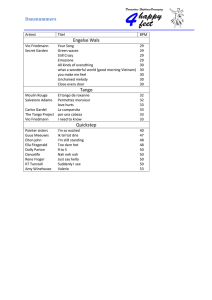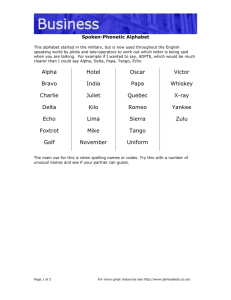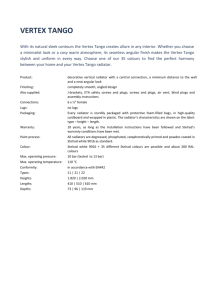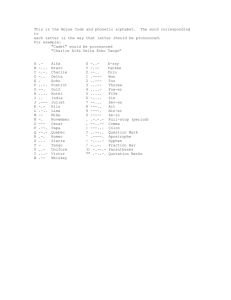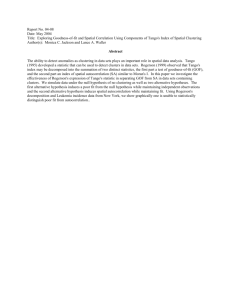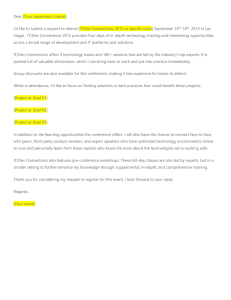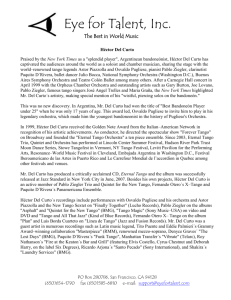Introduction to TANGO Controls
advertisement
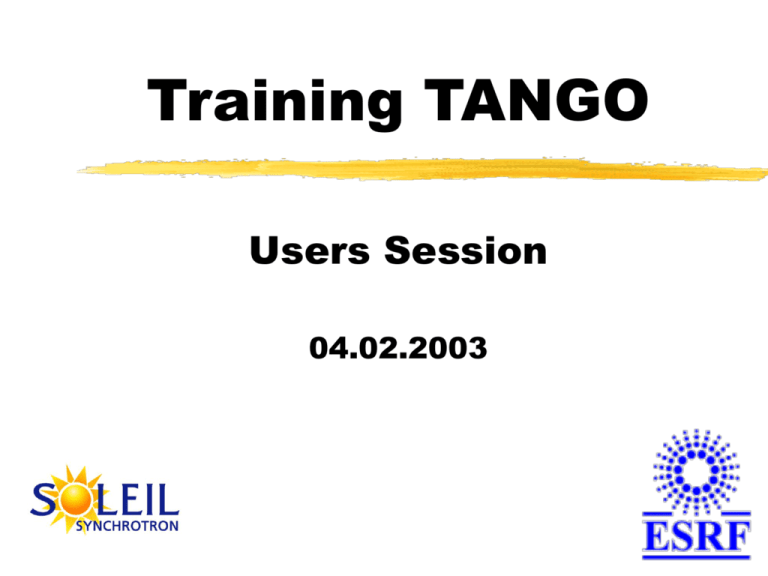
Training TANGO
Users Session
04.02.2003
TANGO : introduction
A «computing tool» dedicated
to the implementation of
distributed systems,
heterogeneous and oriented
control/commande (switch)
TANGO : introduction
Distributed Systems ?
The system components are geographically
distributed on machines connected through a
computing network
Heterogeneous Systems ?
A coherent whole made from heterogeneous
hardwares and softwares
oriented Systems ctrl/command ?
Services adapted to a control system (storage,
logging, alarms, …)
TANGO : introduction
How does TANGO solve the
contraints of activity distribution
and of interoperability
(interaction) of the
heterogeneous components ?
TANGO : introduction
Machine B
Machine A
Application 3
Application 1
L
L
?
SE1
?
Application 2
L
Application 4
?
SE2
L
TANGO : introduction
Machine B
Machine A
Application 3
Application 1
L
L
Application 2
Application 4
L
SE1
SE2
L
TANGO : introduction
Machine B
Machine A
Application 3
Application 1
L
L
Application 2
Application 4
L
SE1
SE2
L
TANGO : introduction
Machine B
Machine A
Application 3
Application 1
L
L
Application 2
Application 4
L
SE1
SE2
L
TANGO : introduction
Machine B
Machine A
Application 3
Application 1
L
L
Application 2
Application 4
L
SE1
SE2
L
TANGO : introduction
Distributed Application
TANGO : introduction
TANGO : introduction
TANGO : introduction
TANGO : introduction
TANGO : introduction
TANGO : introduction
CORBA
(Common Object Request Broker Architecture)
A standard tool in charge of the communications between software
components making up distributed and heterogeneous applications
TANGO : introduction
CORBA = 1 generic tool
support to the development of distributed applications
A powerful but cumbersome tool
No functionalities «ctrl/cmd oriented»
Control System
CORBA
TANGO : introduction
a framework CORBA ctrl/cmd oriented
A toolbox to implement the system
A specialization of CORBA adapted to the needs
Control System
TANGO
Framework
CORBA
CORBA
CORBA
TANGO : introduction
Unifier kernel (core) of the system
Overall consistency
TANGO : introduction
S
C
Control Systm
SOLEIL
(applications network)
S
C
S
Interface
C
Application Logic
S
TANGO
C
Client application.
S
Server Application.
TANGO
Application Logic
Hardware
TANGO : introduction
Unifier kernel (core) of the system
Overall consistency
factorize the services
factorize additions and corrections
TANGO : introduction
Unifier kernel (core) of the system
Overall consistency
factorize the services
factorize additions and corrections
standardize the applications
harmonization of the applications structure
TANGO : introduction
Unifier kernel (core) of the system
Overall consistency
factorize the services
factorize additions and corrections
standardize the applications
harmonization of the applications structure
masks technical details
1 interface of simplified programmation (APIs)
focus on the application logic
TANGO : introduction
Philosophy …
simplicity
mask the CORBA mechanisms
propose simplified APIs
genericity
Enable the writing of generic clients
On the communications point of view: 1 single object type
TANGO : introduction
TANGO : device
an abstract concept : the «device»
central component of the structure (architecture)
Dev
O
Dev
O
Dev
O
Dev
O
Dev
O
Dev
O
Application
Répartie
Control System
Dev
O
Dev
O
Dev
O
Dev
O
Dev
O
Dev
O
TANGO : device : definition
device = 1 <entity> to be controlled
Hardware of software
device «physical» / device «logical»
device = 1 polymorphous object
1
1
1
1
equipment (ex: 1 power supply)
collection of equipments (ex: 1 motor + 1 encoder)
devices agregate (ex: a beamline)
application (ex: 1 agent of the storage service)
TANGO : device : définition
device = 1 equipment
The most simple and widespread case
Interface HW
equipement
Equipement
Ctrl/power supply box
Ionical Pump
Device
BOO-B1/VI/PI55-3
SC User
Unique Identity
(SOLEIL nomenclature)
TANGO : device : definition
device = 1 application
Logic device
1
Device 1
G 1 = f (1)
Device 2
G 2 = f (2)
2
Device 3
3 = h (G 3)
G2
G1
Device 4
G 3 = g(,G1, G2)
G3
G1
Client(s)
G3
3
TANGO : device : class
Belongs to a class
member of a devices’ family
derived from a basic (common) class
generical behavior / common core
Genericity
Device
BPM
Specialization
PowerSupply
Developer
TANGO
BumperPowerSupply
Developer
SC
TANGO : device : interface
Interface
(public)
Implementation
(private)
TANGO : device : interface
Owns a communication interface
interface device <=> class
interface = commands + attributes
commandes actions
attributes physical units
Interface
Commands
public
private
attributes
Generic
Specific
Generic
Specific
Init
State
Status
PowerOn
PowerOff
-
current
Implementation/Realization
TANGO : device : interface
Owns a communication interface
interface device <=> class
interface = commands + attributes
commands actions
attributes physical units
Interface
Commands
public
privé
attributes
Generic
Specific
Generic
Specific
Init
State
Status
PowerOn
PowerOff
-
current
Implementation/Realization
TANGO : device : interface : command
1 action
0 ou 1 entry argument (argin)
0 ou 1 exit argument (argout)
argin & argout = 1 of the 20 TANGO types
Execution : indirect mecanism
-> generic approach of TANGO
-> 1 CORBA method : command_inout
belongs to the generic interface of the devices
dedicated to the fulfillment of non generic commands
• Device’s specificity (PowerSupply, StepperMotor, …)
only one signature : 400 combinations argin/argout !
generic containers (CORBA::any)
TANGO : device : interface : command
About the argin & argout type…
TANGO
Desc
Matlab
DEV_VOID
no argin and/or no argout
-
DEV_STATE
Device status
1-by-n char array
DEV_STRING
Characters chain
1-by-n char array
DEV_BOOLEAN
boolean
1-by-1 uint16 array
DEV_SHORT
Integer 16 bits signed
1-by-1 int16 array
DEV_USHORT
Integer 16 bits non signed
1-by-1 uint16 array
DEV_LONG
Integer 32 bits signed
1-by-1 int32 array
DEV_ULONG
Integer 32 bits non signed
1-by-1 uint32 array
TANGO : device : interface : commande
About the argin & argout type …
TANGO
Desc
Matlab
DEV_FLOAT
real 32 bits
1-by-1 single array
DEV_DOUBLE
real 64 bits
1-by-1 double array
DEVVAR_CHARARRAY
Octets chart (i.e. characters)
1-by-n char array
DEVVAR_ SHORTARRAY
Integers chart 16 bits signed
1-by-n int16 array
DEVVAR_ USHORTARRAY
Integers chart 16 bits not signed
1-by-n uint16 array
DEVVAR_ LONGARRAY
Integers chart 32 bits signed
1-by-n int32 array
DEVVAR_ ULONGARRAY
Integers chart 32 bits not signed
1-by-n uint32 array
DEVVAR_ FLOATARRAY
reals chart 32 bits
1-by-n single array
TANGO : device : interface : commande
A propos du type d’argin & argout…
TANGO
Desc
Matlab
DEVVAR_ DOUBLEARRAY
Reals chart 64 bits
1-by-n double array
DEVVAR_ STRINGARRAY
Non bounded characters chains
chart
1-by-n cell array of
{1-by-n char array}
DEVVAR_LONGSTRINGARRAY
DEVVAR_DOUBLESTRINGARRAY
structure containing an integers
chart 32 bits signed and a
characters chains chart
structure containing a reals chart 64
bits and a characters chains chart
1-by-n struct array {
field lvalue:
1-by-n int32 array
field svalue:
1-by-n cell array of
{1-by-n char array}
}
1-by-n struct array {
field dvalue:
1-by-n double array
field svalue:
1-by-n cell array of
{1-by-n char array}
}
TANGO : device : interface : command
Syntaxe
Prog. env. OO (C++, Java, Python)
argout = dev.command_inout (cmd_name, argin)
User env. (Matlab, Igor Pro, …)
argout = tango_command_inout (dev_name, cmd_name, argin)
Examples Matlab
>>
>>
>>
>>
>>
>>
>>
help tango_command_inout
dev = ‘tango/tangotest/1’
tango_command_inout(dev,‘DevDouble’,pi)
tango_command_inout(dev,‘DevVarDoubleArray’,[1,2,3])
s.dvalue = [pi, 2*pi, 3*pi]
s.svalue = {‘dev’, ‘var’, ‘double’, ‘array’, ‘test’}
tango_command_inout(dev,‘DevVarDoubleStringArray’,s)
TANGO : device : interface : command
Name and signature of the commands ?
Device’s Documentation
http://controle/DeviceServers/Galil/doc_html
Prog. env.. OO (C++, Java, Python)
cmd_list_info = dev.command_list_query ()
cmd_info = dev.command_query (cmd_name)
User env. (Matlab, Igor Pro, …)
cmd_list_info = tango_command_list_query (dev_name)
cmd_info = command_query (dev_name, cmd_name)
Examples Matlab
>> tango_command_list_query(dev)
>> tango_command_query(dev,‘DevDouble’)
>> tango_print_cmd_list(dev)
TANGO : device : interface : command
Errors processing
Prog. env.. OO (C++, Java, Python) :
• exceptions : mechanism try/catch (DevFailed & derived)
User env. (Matlab, Igor Pro, …) :
• error code : updating after each execution of a «command»
Examples Matlab:
>> result = tango_command_inout(dev,‘dummy’,pi);
>> tango_error
if tango_error == -1 then …
• result is invalid, indéfini
• result can be not of the expected type !
• Do not use it !
>> help tango_error
• an example to follow !
TANGO : device : interface : commands
TANGO : device : interface
Has a communication interface
interface device <=> class
interface = commands + attributes
commands actions
attributes physical units
Interface
Commands
public
privé
attributes
Generics
Specifics
Generics
Specifics
Init
State
Status
PowerOn
PowerOff
-
current
Implementation/Realisation
TANGO : device : interface : attribute
Definition
Physical unit produced or administrated by the device
ex: a motor’s position, alimentation power supply., …
Format
From 0 to 2 dimensions
SACLAR
SPECTRUM (i.e. vector)
IMAGE (i.e. matrix)
Type
DEV_SHORT, DEV_LONG, DEV_DOUBLE
• scalar, spectrum or image
DEV_STRING
• scalar only
TANGO : device : interface : attribute
Accessibility
READ
accessible in read only
WRITE
accessible in write only
READ_WRITE
accessible in read AND in write only
Consigne (instructions) vs effective value
READ_WITH_WRITE
1 attribute READ linked to 1 attribute WRITE
exotic (prefer READ_WRITE)
TANGO : device : interface : attribute
Features : autodescriptive & parametrizable
1 attribute -> 18 properties
generic properties (attribute)
8 non-modifiable properties (developer)
•
•
•
•
•
name : attribute’s name
data_type : data type (DEV_SHORT, DEV_LONG, …)
data_format : data format (SCALAR, SPECTRUM or IMAGE)
writable : access mode (READ, WRITE, …)
max_dim_x, max_dim_y : dimensions max
– dim_x <= max_dim_x
– dim_y <= max_dim_y
• disp_level : expert or operator
• wrt_attr_name : name of the attibute WRITE associated
TANGO : device : interface : attribute
10 modifiable properties (user)
•
•
•
•
•
•
description : attr. Description (text)
label : label associated to the attr. (text)
unit : unit in which is expressed the value associated to the attribute (text)
standard_unit : conversion factor to the units MKSA (text)
display_unit : unit * standard_unit (text)
format : display format for the «numerical» attributes (texte)
– Key-words : fixed, scientific, uppercase, showpoint, showpos, setprecision(), setw()
– ex : scientific;uppercase;setprecision(3)
•
•
•
•
min_value : min. value of an attribute WRITE or READ_WRITE (text)
max_value : max. value of an attribute WRITE or READ_WRITE (text)
min_alarm : alarm threshold <low> of an attribute READ or READ_WRITE (text)
max_alarm : alarm threshold <high> of an attribute READ or READ_WRITE (text)
TANGO : device : interface : attribute
List of the attributes ?
Documentation of the device
http://controle/DeviceServers/Galil/doc_html
Prog. env. OO (C++, Java, Python)
attr_list = dev.get_attribute_list ()
User env. (Matlab, Igor Pro, …)
attr_list = tango_get_attribute_list (dev_name)
Example Matlab
>> attr_list = tango_get_attribute_list(dev)
TANGO : device : interface : attribute
Standard configuration of an attribute ?
Prog. env. OO (C++, Java, Python)
attr_config_list = dev.get_attribute_config(attr_name_list)
attr_config_list = dev.attribute_list_query()
attr_config = dev.attribute_query(attr_name)
User env. (Matlab, Igor Pro, …)
attr_config_list = tango_attribute_list_query(dev_name)
attr_config_list = tango_get_attributes_config(dev_name, attr_name_list)
attr_config = tango_attribute_query(dev_name, attr_name)
attr_config = tango_get_attribute_config(dev_name, attr_name)
Example Matlab
>> help tango_attribute_list_query
>> acl = tango_attribute_list_query(dev)
>> acl(2)
TANGO : device : interface : attribute
Modify an attribute’s configuration ?
Take care of the consequences !
acts upon all the clients
sensitive parameters : min/max_value, min/max_alarm
Prog. env.. OO (C++, Java, Python)
dev.set_attr_config (attr_config_list)
User Env. (Matlab, Igor Pro, …)
tango_set_attribute_config (dev_name, attr_config)
tango_set_attributes_config (dev_name, attr_config_list)
Example Matlab
>> help tango_set_attributes_config
>> scc = tango_get_attribute_config(dev, ‘short_scalar’)
>> scc.min_value = num2str(str2num(scc.min_value) / 2)
>> scc.max_value = num2str(str2num(scc.max_value) / 2)
>> scc.description = ‘This is a dummy attribute’
>> tango_set_attribute_config(dev, scc)
TANGO : device : interface : attribute
Obtain the standard value of an attribute ?
attributes READ, READ_WRITE ou READ_WITH_WRITE
Result of the lecture => structure {read value + infos }
name : name of the attribute
quality : quality of the returned value
• ATTR_VALID : ok, the returned value is valid
• ATTR_ALARM : an alarm threshold has been crossed (cf. min_alarm and max_alarm)
• ATTR_INVALID : error, undefined value
dim_x : dim.x of the value (dim_x <= attr_config.max_dim_x)
dim_y : dim.y of the value (dim_y <= attr_config. max_dim_y)
timestamp : value stamp
value : value of the attribute at this very instant <timestamp>
• SCALAR
– READ : [0 : val]
– READ_WRITE et READ_WITH_WRITE : [0:measure, 1:consigne]
• SPECTRUM
– [0 : measure, …, dim_x – 1 : measure]
• IMAGE
– [0 : measure, …, dim_x – 1 : measure] x [0 : measure, …, dim_y – 1 : measure]
TANGO : device : interface : attribute
Obtain the standard of an attribute ?
Prog. env. OO (C++, Java, Python)
dev.read_attributes (attr_name_list)
User Env. (Matlab, Igor Pro, …)
tango_read_attribute (dev_name, attr_name)
tango_read_attributes (dev_name, attr_name_list)
Example Matlab
>>
>>
>>
>>
help tango_read_attribute
scv = tango_read_attribute (dev, ‘short_image’)
datestr(scv.time)
for i=1:10 s=tango_read_attribute(dev, ‘short_spectrum’);
plot(s.value); drawnow; end;
TANGO : device : interface : attribute
Modify the value of an attribute ?
attributes WRITE, READ_WRITE et READ_WITH_WRITE
attr_config.min_value <= set value <= attr_config.max_value
exception API_WAttrOutisideLimit
Prog. env. OO (C++, Java, Python)
dev.write_attributes (attr_val_list)
User Env. (Matlab, Igor Pro, …)
tango_write_attribute (dev_name, attr_name, value)
tango_write_attributes (dev_name, attr_name_attr_value_struct_list)
example Matlab
>>
>>
>>
>>
>>
>>
>>
help tango_write_attribute
tango_write_attribute (dev, ‘short_scalar’, 123456789)
tango_print_error_stack
tango_write_attribute (dev, ‘short_scalar’, int16(123456789))
tango_print_error_stack
tango_write_attribute (dev, ‘short_scalar’, int16(1024))
tango_read_attribute (dev, ‘short_scalar’)
TANGO : device : Status
1 device -> 1 status
behavior = f (internal status)
request -> internal status -> execution or exception
Internal status run by the device
14 predefined status
ON, OFF, CLOSE, OPEN, INSERT, EXTRACT, MOVING, STANDBY, FAULT, INIT,
RUNNING, ALARM, DISABLE, UNKNOWN
known and run by the clients (particularly generic)
Obtain the current status of a device ?
Prog. env. OO (C++, Java, Python)
dev.state ()
User env. (Matlab, Igor Pro, …)
dev_state = tango_state (dev_name)
example Matlab
>> help tango_state
>> tango_state(dev)
>> tango_status(dev)
TANGO : properties
Definition
Configuration Data
concept spread to all TANGO entities
attribute, device, classe, system
Attribute’s property
18 properties TANGO predefined + …
… properties defined by the developer
ex: initial value of an attribute
Device’s property
specific to the device
defined by the developer
ex: adress GPIB of a peripheric
Class property
shared with all the devices of the class
defined by the developer
ex: URL of the documentation
System’s property
shared with all the devices of SC
ex: an info related to a centralized service (port nr of the storage service)
TANGO :
properties
Ex : Manipulate the value of a device’s property ?
Beware the consequences !
initialization of the devices
Prog. env.. OO (C++, Java, Python)
indirect way (cf. TANGO doc)
User env. (Matlab, Igor Pro, …)
prop_val = tango_get_property (dev_name, prop_name)
prop_val_list = tango_get_properties (dev_name, prop_name_list)
prop_val = tango_put_property (dev_name, prop_name, prop_val)
prop_val_list = tango_put_properties (dev_name, prop_name_list)
tango_del_property (dev_name, prop_name)
tango_del_properties (dev_name, prop_name_list)
example Matlab
>> help tango_get_property(dev, ‘mthreaded_impl’)
>> tango_get_property(dev, ‘mthreaded_impl’)
TANGO : device
TANGO : device : summary
Device
Generic
Behavior
ID Unique
Classe
ens-[seg]/dom/elem.1
My Device
Commands
attributes
Status
properties
Instanciation
ens-[seg]/dom/elem.2
ens-[seg]/dom/elem.3
Where to store the properties and all
the configuration data ?
TANGO : database (static)
Database of the configuration
critical element of the system
The only information source for the devices and the clients
Content : 7 tables
server : infos related to the servers (admin. du SC)
device : infos related to the devices (IOR=@particularly the network)
property : global properties associated to SC
property_class : properties associated to a class of devices
property_device : properties associated to a particular device
property_attribute_class : properties associated to an attribute (for any device)
property_attribute_device : properties associated to an attribute of a particular device
Implementation
1 dedicated device = interface TANGO of a SGBD
TANGO_HOST = host_name:host_port (ex: localhost:20000)
TANGO : device server
S
C
Control system
SOLEIL
(applications network)
S
C
S
C
S
C
Client Application
S
Server Application
DServer
Device
Device
Device
Device Server
Admin.
SC
TANGO
TANGO system
{Device Servers {Devices}}
+
Static DB
TANGO : APIs and platforms
APIs/Programming Languages
C++ (performances)
Serveurs
Java (portability)
Python (scripts)
Others (Matlab, Igor Pro, LabView)
platforms
Linux
Windows NT/2000/XP
Sun-Solaris
Clients
Questions…
TANGO : Java Tools
LogViewer
Management of messages generated by the devices
DeviceTree
Generic Client : tests, monitoring, …
Jive
Administration of the TANGO database
Pogo
Code generator (dev. devices)
